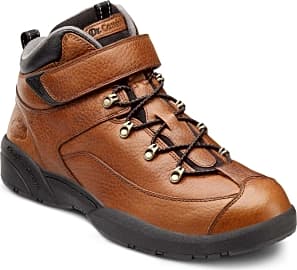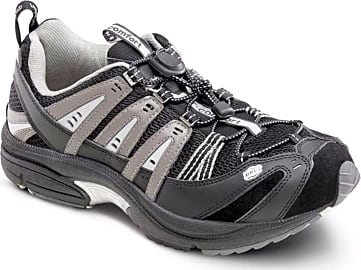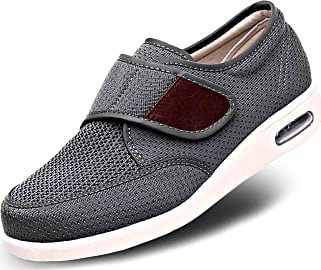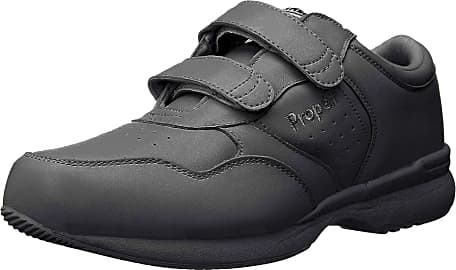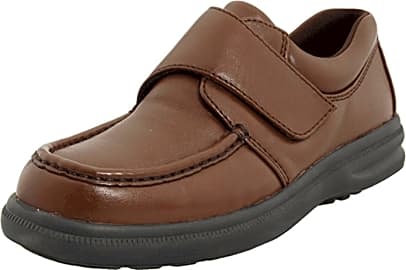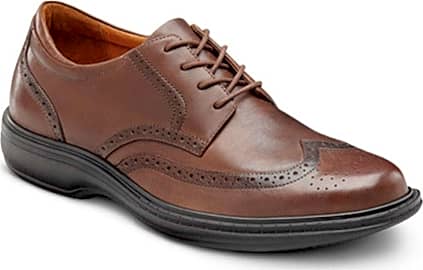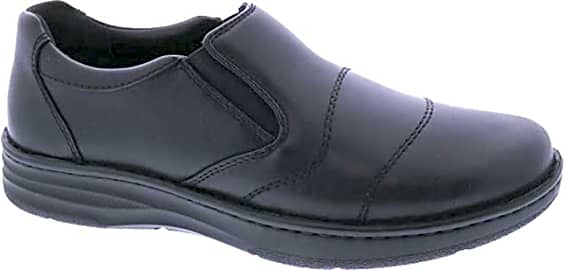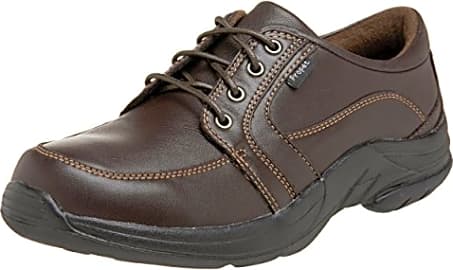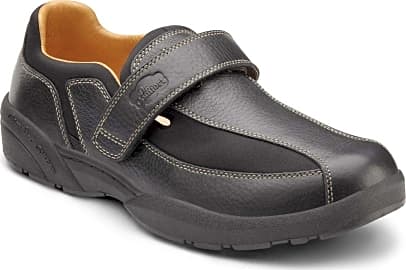The 10 Best Men's Diabetic Shoes

This wiki has been updated 41 times since it was first published in December of 2016. Diabetics, and those close to them, know that the condition can affect much more than a person's blood sugar; it can also damage nerves and vessels throughout the body. The specially designed shoes on this list offer arch support, removable insoles, and ample room, so sufferers can keep up an active lifestyle without having to worry about discomfort. And there is a range of styles to choose from. When users buy our independently chosen editorial selections, we may earn commissions to help fund the Wiki.
Editor's Notes
March 05, 2021:
Unlike with regular sneakers, the maker's of diabetic shoes generally don't release a new version every single year just to appeal to the changing tides of fashion. Instead, they put more focus on comfort and wearability, which is really the most important thing in this category. Because of this, we didn't need to make a lot of changes to our recommendations. The one exception to this was to remove the Dr. Comfort Edward-X in favor of the Dr. Comfort Performance-X. We did this because we noticed a distinct lack of any dedicated running shows, and since it is so important for diabetics to stay active, we felt this was an unforgivable oversight. Now, there are options that run the full gamut of uses, from hiking boots like the Dr. Comfort Ranger, to dress shoes like the Dr. Comfort Wing, to casual walkers like the New Balance Hook and Loop, and more.
October 05, 2019:
If you suffer from diabetes, you probably already know how the condition can impact your mobility and comfort. Poor circulation in the feet is one of the most common symptoms of diabetes, so it is important to wear the proper footwear if you want to continue engaging in activities that require standing or walking. The shoes in this list are designed to gently support the foot and lower the wearer's risk of developing pressure ulcers. To reduce your risk further, pair your diabetic shoes with diabetic socks, which help alleviate pressure on vulnerable points on the foot.
New to the list are the Dr. Comfort Ranger, Orthoshoes Mesh, and Dr. Comfort Wing, all of which boast the extra support necessary for individuals with diabetes, as well as other conditions that affect the legs and ankles. The Dr. Comfort Ranger was chosen primarily due to its outdoorsy design, while the Dr. Comfort Wing was included because of its elegant look. The Orthoshoes Mesh is a super-casual shoe that is ideal for wearing around the neighborhood or while running errands. Unfortunately, the Orthofeet 420 had to be removed due to fulfillment issues.
Special Honors
Anodyne No. 88 Good for casual wear or long work days on your feet, the Anodyne No. 88 are reasonably versatile, and their black exterior hides dirt and scuffs well. They are anti-microbial treated to help prevent the buildup of odors and have a strong shank for support. anodyneshoes.com
What Diabetes Does to Your Body
It elevates your blood pressure, putting a strain on your entire circulatory system, and can raise both your cholesterol and your risk of stroke.
Diabetes is one of the most common — and debilitating — diseases in America today. It's estimated that over 27 million Americans suffer from it, with another 86 million showing early signs of the affliction. Despite this, however, it's a disease that's still widely misunderstood.
Your body makes a hormone called insulin that helps you break down glucose and convert it into energy. Some people, however, can't keep up with the amount of glucose in their bloodstream, despite their bodies producing more and more insulin. That insulin responds by packing cells to the gills with glucose.
Now, your body has a new problem on its hands (or pancreas): a lack of glucose in the bloodstream. So, your body will alert your liver to this problem, and demand that it release stored glucose. While it does that, it also reduces the amount of insulin being produced. This imbalance creates a high level of sugar in your blood.
That sugar then goes on a rampage. It can attack your eyes, heart, kidneys, and just about everything else. This is because it impacts your blood vessels and nerves, so it can travel all over your body. It elevates your blood pressure, putting a strain on your entire circulatory system, and can raise both your cholesterol and your risk of stroke.
There are different types of diabetes, as well. Type 1 diabetes is usually caused by a genetic predisposition, as it's triggered by an autoimmune response that attacks the pancreas.
Type 2 diabetes, on the other hand, can be affected by lifestyle choices in addition to genetics. Anyone who is sedentary, overweight, or who has a history of heart disease and high blood pressure is highly at risk.
The good news about Type 2 diabetes is that it can be managed with medication and behavioral changes. Increasing your activity level and eating a well-balanced diet can help lower blood sugar levels, and you might even be able to slow down or even reverse the progression of the disease.
Diabetes — regardless of the type — is no joke, and if you suffer from it, or are on the road to suffering from it, it's worth taking every precaution to safeguard your health. If managed properly, you can limit the damage, as well as increase your life expectancy to near-normal levels.
But then again, do you really want to live longer if it means you can't have sugar?
The Importance Of Wearing Diabetic Shoes
If you've been diagnosed with diabetes, there's a variety of changes you need to make to your lifestyle, not least of which is the type of shoes you wear.
Many people experience something called peripheral neuropathy, which is when the nerves in your feet become damaged. As a result, you're less likely to notice things like blisters, cuts, and sores, allowing them to fester and become infected.
Some people may even need to have shoes custom-made by a podiatrist, especially if they have an advanced deformity.
Diabetes can even change the shape of your feet. You're more likely to develop hammertoe, which bends the toe joints inward. Most regular shoes aren't designed to be able to accommodate this.
Diabetic shoes, on the other hand, were created to keep your feet comfortable, regardless of their condition. Many have more room than regular shoes, and they're less likely to cause the skin to slough off or become damaged.
Some people may even need to have shoes custom-made by a podiatrist, especially if they have an advanced deformity. Others may be fine with just adding an orthotic or modifying existing footwear to have thicker soles.
When shoe shopping, the important thing to look for is comfort (do not get a pair that you're expecting to "break in"), and be sure you can tighten or loosen them easily. It should be made of a lightweight and flexible material, yet have a thick, shock-absorbing sole.
We'll be honest with you — you may have to sacrifice style here. But it's more than worth it when your health and comfort are at stake.
Then again, you could always just tie a couple pillows to your feet, but we don't recommend it.
Living With Diabetes
Diabetes is no picnic (neither are picnics, for that matter, when you can only eat sugar-free food). Managing it can be a full-time job, but there are a few things you can do to make your life easier.
The most important thing is to not get too stressed, or give up. There are a lot of changes you'll need to make, and chances are, you'll slip up a time or two along the way. That's fine — but you should know that beating yourself up over it will probably be worse for you than the mistake itself. Yoga and meditation are great ways to manage your stress.
You should pamper your feet beyond just buying diabetic shoes.
Eating right and exercise will be your best friends. Not only can they slow down the progression of the disease, but they'll lower stress levels, boost your self-confidence, and give you extra energy
While eating the right kind of food is important, so is portion control. Eat a reasonable amount at every meal (smaller plates can help with this), and don't skip meals.
You should pamper your feet beyond just buying diabetic shoes. Inspect them for cuts every day, and wash them in warm water daily, as well. Try to keep them well-moisturized, and keep your toenails neatly trimmed.
When sitting, keep your feet elevated, and wiggle your toes every now and then to keep blood flowing. Don't sit in one place too long; get up and stretch your legs every couple hours or so.
Once you get the hang of it, you should be able to live a full life without diabetes slowing you down. Just listen to your body, and remember than an ounce of prevention is worth a pound of cure — and you need to be careful about adding on any pounds.


